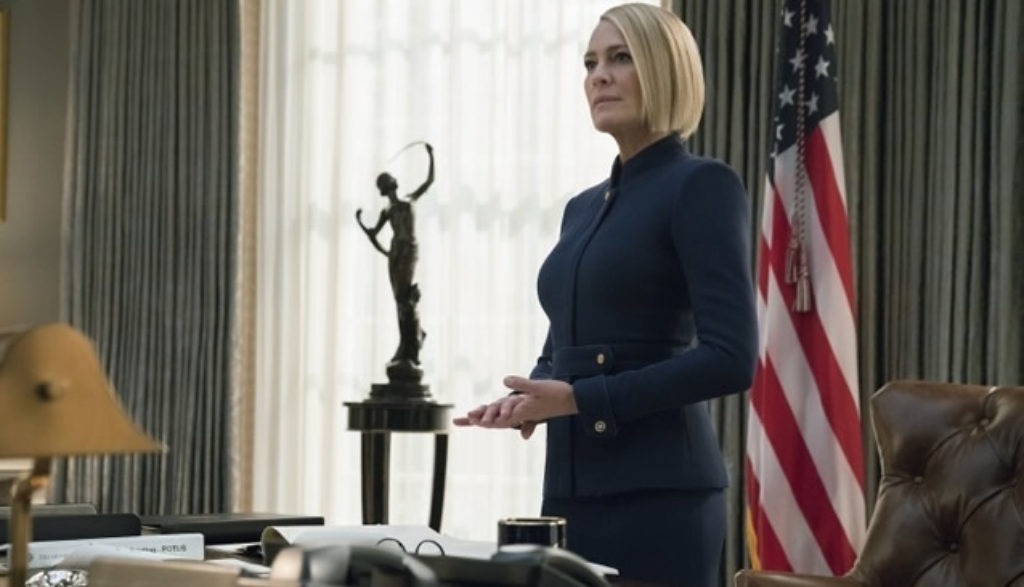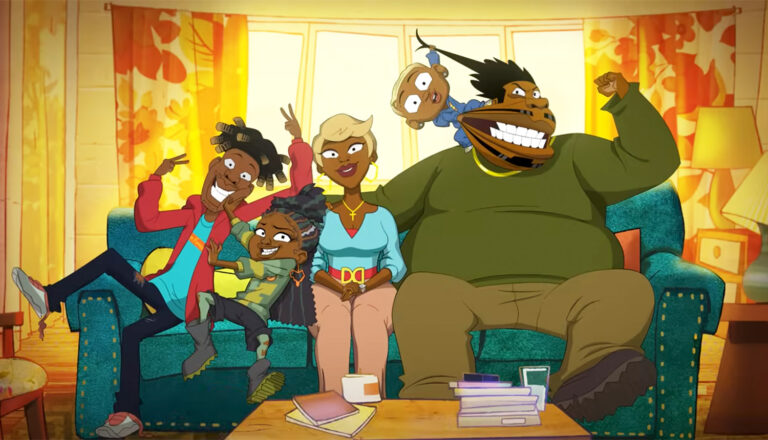
Power corrupts, goes the old adage. And the more power you want, the more corrupt you have to be to get it.
Francis Underwood had a weakness for power. He breathed it, sweated it. For more than 20 years, he walked the halls of power in Congress, rising through the ranks. But wasn’t enough for him. He wanted the big chair in the Oval Office, and he would—and did—kill to get it.
“That’s how you devour a whale,” he says. “One bite at a time.”
But in so doing he became that whale. And then the entrée. Now Frank’s political friends and enemies and even his darling wife—the woman who herself rapidly rose from First Wife to Vice President to, now, Madame President—are dining, and choking on, the leftovers.
House of Cards is a reimagining of a 1990 BBC miniseries (which was based on a novel by Michael Dobbs). But little of that British beginning remains here, certainly not in the show’s final act. Delving deeply into the imagined muck of the Beltway, following the Underwoods’ Machiavellian machinations with a sort of detached relish, this series feels inherently American. Not in a Mr. Smith Goes to Washington way, but rather in a democratic-underbelly-we-hope-isn’t-real-but-fear-might-be way.
Produced and launched (but not consistently directed) by David Fincher (the Oscar-nominated director of The Social Network, Gone Girl and The Girl With the Dragon Tattoo), this political drama has an A-list cast and a glamorous sheen of prestige. “I felt for the past 10 years that the best writing that was happening for actors was happening in television,” Fincher told hitfix.com. “And so I had been looking to do something that was longer form.” Netflix outbid cable rivals such as HBO and AMC to land the program, believing it was the perfect beginning in its effort to build its own brand of Emmy-worthy “television.” It put Netflix on the map. And like Frank Underwood, Netflix never looked back.
But Netflix did, perhaps a bit ironically, ax Frank Underwood.
Kevin Spacey, who played the duplicitous Underwood, was the show’s unquestioned megawatt star for most of its run, becoming a perennial Emmy nominee. But after more than a dozen men and teen boys accused Spacey of sexual harassment and assault, he was booted from the show and his character was killed off, making way for his fictional wife (played by Robin Wright) to claim the show’s Oval Office.
But while Wright’s Claire Underwood has made a break from the past (even reclaiming her maiden name, Hale), the dirty tricks remain the same. And just like Frank before her, nothing will stop Claire from advancing her agenda.
House of Cards was the original poster child for binge-watching, and few binged more than the District of Columbia’s own politicians. Former President Barack Obama even tweeted before Netflix unveiled the second season: “Tomorrow: @HouseOfCards. No spoilers, please.”
But while the writing is sharp and the acting keen, the series falls short of being must-see TV. Indeed, the MA-rated show makes for some seriously uncomfortable viewing.
The political maneuvering on the show is clearly underhanded and often illegal, sometimes even murderous—a problematic, if expected, aspect of the series. Sex is both pastime and weapon for these gladiator politicians as they work hard to keep their sordid interludes away from the eyes of the press … but in full view of online viewers.
Indeed, sex scenes can be very graphic—occasionally as explicit and skin-centric as anything one might see on HBO’s Game of Thrones. F- and s-words make regular appearances, as do hardcore drugs. The spiritual vibe can be offensive. And violence is merely another “tool.”
If House of Cards was a feature film, not a TV series, it’d fit comfortably and undeniably under a scarlet R rating. So despite all of its buzz, House of Cards still hits well below the Beltway.
Though still (ahem) in mourning for her (ahem) beloved husband, Claire turns her attention to the business of the country, and being its first female president. The death threats—quadruple what her husband dealt with, and distinctly misogynistic in nature—are the least of her concerns. What she’s really eyeing is a showdown with Bill and Annette Shepherd, wealthy supporters who want Claire to stand down from a controversial political endorsement.
Someone tries to kill Claire, though the bullet-proof glass of her limo foils the attempt. It’s suggested that the assassination attempt was more of a warning than something intended to be truly life-threatening, an attack perhaps sponsored by Bill Shepherd himself. The actual would-be assassin apparently killed himself, and Claire says the attempt “was the first sign of real respect I’ve gotten in a hundred days.”
We hear other graphic threats to Claire’s life, including one that suggests skinning her and cutting the body into several pieces to mimic the American flag. Another Twitter critic says “God never intended a woman to rule this land,” calling her both the Antichrist and a “Jew.” We hear Doug Stamper, who’s staying at a mental facility, talk about a murder he committed for Frank Underwood when the latter was still alive. Stamper also talks about why he was, and is, so loyal to the man: Frank helped Doug detox from liquor. During the recovery process, Doug says, “I shook so badly I thought I was going to die.”
In flashback, we see Claire as a young girl, smoking a cigarette in a white dress. Some boys come by and apparently cut her dress off, which she runs away with, wearing just her underwear. Later, as she hides in a barn (her dress haphazardly tied around her), a boy peers in through a hole in the wood and apologizes for sending the boys after her. She jams a broom handle into the boy’s eye.
Annette tells Claire that it must’ve been horrible to have Frank die lying next to her—perhaps suggesting that Annette believes Claire may have had something to do with his murder. Doug walks around a meditative labyrinth, an apparent chapel standing in the background. People drink wine and martinis. There’s talk of prescribing antipsychotic medication to someone who already has a history of addiction.
We hear two f-words, one s-word, the c-word (along with a couple other references to said word) and one abuse of Jesus’ name. Claire extends a crude hand gesture.
With the presidential elections just days away (and with Claire Underwood running on the president’s ticket as vice president), Frank’s political machinations are in overdrive—including pushing the country to go to war with a terrorist organization.
Frank works hard to make that happen behind the scenes, promising under-the-table deals with key states if they agree to open up military-manned “voting centers” (characterized as terrorist prevention, but still an act that Underwood and his opponents know will suppress votes for his opponent). Meanwhile, Underwood’s mole in the NSA hacks into that intel agency’s computers to erase incriminating information—a hack that is made to look like the work of terrorists. Elsewhere, there’s a reference to a beheading.
Claire and her speechwriter/lover make out on her bed. The scene involves removal of clothing and some nudity, but stops short of sex. The speechwriter asks what he’ll be to her when she’s elected vice president. “First … boyfriend? First concubine?” When the speechwriter refers later to himself as a “mouthpiece,” a journalist friend asks him, “Has she put you in charge of any of the other parts?”
There’s also an insinuation that Frank had a homosexual relationship before marrying Claire. (“I know how you felt about him,” Claire tells Frank. “Or I can imagine.” “You know you’re the only person I’ve ever truly loved,” Frank tells her.) Frank’s associates wonder whether a variety of tawdry secrets—including a governor having an affair with another man, and a staffer’s starring role in a bit of online revenge porn—will be enough dirt to blackmail him. (We hear panting on phones during the revenge porn clip.)
Three f-words and two s-words. We also hear “a–” and “h—.” God’s name is misused five times, twice with “d–n.” Jesus’ name is misused once. Characters drink beer and whiskey.
“Chapter 30”
Frank is beginning to show the strains of the office. He attends the funeral of three young soldiers killed in action. He’s scolded by a civilian who was severely injured in a military drone attack. “There’s a fine line between duty and murder,” the man says. Shaken, Frank goes to a cathedral and asks the bishop to talk to him about justice, admitting that while he understands the Old Testament God, Jesus is a mystery to him.
“It’s not your place to determine what version of God you like best,” the bishop tells him. “It’s not your duty to serve your country alone, and it better not be your goal to simply serve yourself. You serve the Lord. And through Him you serve others.” But when the bishop leaves, Frank turns to a carving of Jesus on a crucifix and says, “Love? That’s what you’re saying? Well, I don’t buy it.” And then he spits on the cross. When he moves to wipe away the spittle, the statue falls and shatters on the floor. Frank picks up a piece and walks out, saying, “Well, I’ve got God’s ear now.” Frank also learns a line or two from the Quran. We hear a priest recount the story of Abraham and Isaac, and a woman mention how important faith is to her.
An FBI agent lies to get close to a source, who apparently recently split with a lesbian lover. Russians arrest a homosexual activist to pressure the U.S., and there’s talk about the intersection of free speech and gay rights. We hear references to infidelity and homophobia. A number of people make underhanded political moves. The f-word is flung around four times, “d–n” twice and “h—” once.
“Chapter 14”
As he prepares to move into the VP chair, Underwood begins plotting his next set of Machiavellian moves—one of which is murder. (He pushes a woman in front of a subway train, whereupon we see the fall and hear the impact.) Loyal bodyguard Stamper ushers a potentially incriminating prostitute out of D.C. Claire gets a pregnant woman’s insurance cancelled so that she’ll start playing the game. “I’m willing to let that child wither and die inside you, if that’s what’s required,” Claire tells her. We hear other threats and discussions of another murder, as well as how pigs are butchered. A woman tries to stab someone.
Zoe and editor/lover Lucas have sex. We see movement and hear explicit conversation. She walks to the shower, naked (fully visible from the rear, as well as much of the side). A friend receives obscene pictures of her, including one with her breasts exposed.
We hear the f-word a dozen times, the s-word once. (Cufflinks bear the letters “F” and “U.”) Other swears include “b‑‑ch,” “a‑‑,” “h‑‑‑” and “d‑‑n.” Jesus’ name is abused once. Characters drink.
“Chapter 1”
In this series opener, Underwood, with help from wife Claire, begins to pull together his scheme to undermine the executive branch of government, pulling in the pawns they’ll need. One is troubled pol Peter Russo, who has sex with a staffer (we see movements, his bare backside and her bare breasts) and then, later, gets busted for DUI. Another is the sexuality-flaunting reporter Zoe Barnes. Underwood ogles her first, then decides to work with her, giving her someone’s proposals to publish. “We’re in a very gray area, ethically, legally,” Zoe says. “Which I’m OK with.”
Russo has an illicit conversation with his staffer on the phone. He also makes a graphic suggestion after the two have sex. We hear a reference to a politician being secretly gay. We see people drink wine and whiskey. Underwood smokes cigarettes. We hear the sounds of him putting down a dog that’s been hit by a car. People act in a duplicitous manner.
When Russo swears to God that his DUI arrest was a lone misstep, Underwood says, “Then you must hold God in very low esteem, because we both know that’s a lie.” We see Washington’s elite at a church service, where the priest exhorts them to be humble, quoting Matthew 23:12.
Characters say the f-word four times, the s-word twice, “pr‑‑k” and “a‑‑” once each. They also abuse Jesus’ name twice and God’s name four or five times.


Paul Asay has been part of the Plugged In staff since 2007, watching and reviewing roughly 15 quintillion movies and television shows. He’s written for a number of other publications, too, including Time, The Washington Post and Christianity Today. The author of several books, Paul loves to find spirituality in unexpected places, including popular entertainment, and he loves all things superhero. His vices include James Bond films, Mountain Dew and terrible B-grade movies. He’s married, has two children and a neurotic dog, runs marathons on occasion and hopes to someday own his own tuxedo. Feel free to follow him on Twitter @AsayPaul.

An elf mage contemplates on connection and regret as she watches her human friends grow old and pass away.

Netflix takes a classic sitcom, Good Times, and turns it into a vulgar, violent, sexually-charged TV-MA show.